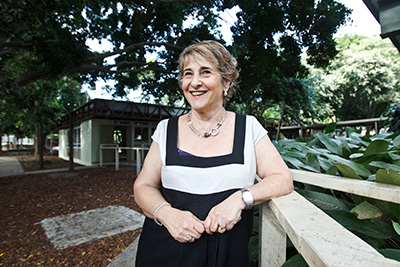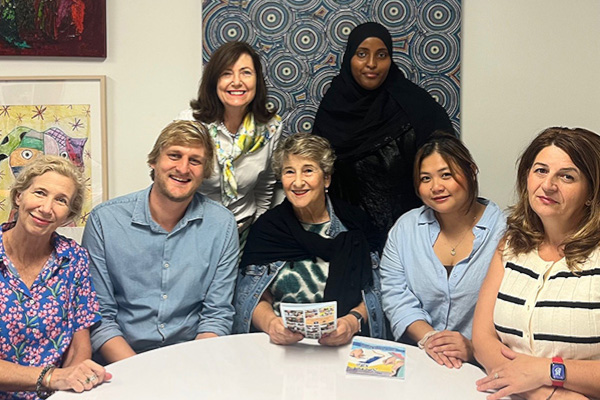Every time a conflict erupts somewhere in the world, Milpera State High School feels it.
Not in the way most schools might, through news bulletins or class debates, but in the faces of the children who arrive shortly after the headlines start.
When war broke out in Ukraine, students in embroidered vyshyvankas joined the school. After crises in Myanmar, Afghanistan, Sudan and Syria, the enrolments followed—young people and their families arriving with little English but immense hope.
For 40 years, Milpera has welcomed them all.
The Brisbane school is unlike any other in Queensland. It was purpose-built as a settlement school, where newly arrived refugee and migrant students receive intensive English language support, trauma-informed care and the tools to begin a new life in Australia.
The school currently supports around 380 students from more than 50 different nationalities.
'Milpera is a mirror of the world,' says current Principal Julie Peel.
'You can trace international politics through our enrolments. It’s heartbreaking, but it’s also incredibly hopeful. Here, these students get the chance to restart.'
That’s exactly what Adele Rice, the school’s founding principal, envisioned when she helped establish the school in 1984. It was a bold move that would make Milpera a national model for refugee education.
A vision that changed lives
 Portrait of Adele Rice.
Portrait of Adele Rice.
Now 82, Adele is officially retired but remains a tireless advocate for migrant communities, and a revered figure in the Milpera community.
'Working with migrants has enriched my life,' Adele says.
'I never think of myself as committed to a cause—that sounds too neat. It was just about people, and what they needed.'
Julie, who joined Milpera 20 years ago following a 10-year career as a science teacher, became principal in 2020 and said the school’s culture is still shaped by Adele’s legacy.
'Adele built something from nothing,' she says.
'It was ahead of its time. A school that wasn’t just about education, but about belonging.'
Milpera’s campus in the suburb of Chelmer became a home away from home for thousands of students. The surrounding community rallied around it.
A key part of that support has always been the school’s volunteers. This dedicated group includes retired teachers, academics, refugee advocates and professionals, including a human rights lawyer.
'It’s what I call our million-dollar workforce,' Julie says.
'The classroom culture they help create is like a family. It’s part of the secret to this school’s success.'
At its peak, Milpera’s volunteer program had 150 people on its books and that tradition of service continues today.
From trauma to transformation
Over the decades, the school has welcomed waves of students to Australia. From Latin America in the 1980s, the Balkans in the 1990s, the Horn of Africa in the 2000s, and Afghanistan and Myanmar in more recent years.
'Milpera’s population is always a reflection of what’s happening somewhere else in the world,' Adele says.
Julie agrees.
'This year we’ve had students from the Rohingya community, from Congolese refugee camps, from Sudan, and still more from Afghanistan,' she says.
'The world changes, and Milpera responds.'
The school works closely with the Department of Education to have its intensive and complex work adequately resourced. Julie is also proud of how Milpera has adapted its model to support students outside the southeast.
'Our Milpera Live online program is reaching more than 70 students in over 20 schools across Queensland,' she says.
'Their teachers get to learn from us, and those students get that same kind of tailored support. It’s not a full replacement, but it’s a strong start.'
A place where students are seen
 At the table from left to right: Jane Griffin (Art Therapist), Sam Dilly (Deputy Principal), Adele Rice AM (Founding Principal), Chrissy Wah and Nermina Halilovic; back row: Julie Peel (Principal) and Riyan Kadir Musa (Teacher Aide).
At the table from left to right: Jane Griffin (Art Therapist), Sam Dilly (Deputy Principal), Adele Rice AM (Founding Principal), Chrissy Wah and Nermina Halilovic; back row: Julie Peel (Principal) and Riyan Kadir Musa (Teacher Aide).
The school’s intensive English program is grounded in both research and compassion. Students often arrive with interrupted or no formal schooling, and many carry deep trauma.
'It takes 4 years to learn a language if you’re literate in your first one,' Julie says.
'If you’re not, it can take 5 to 9. And many of our kids are only with us for 6 to 18 months, so what we do in that time has to be powerful.'
Despite the challenges, Milpera students flourish—gaining language, a sense of belonging and the confidence to embrace the future.
'In that short time, we can see their English improve by 2 whole band scales,' Julie says.
'But it’s more than that. They gain a sense of self, a sense of possibility. That’s what Milpera gives them.'
Adele sees that too.
'Language and education are everything,' she says.
'They are the foundation of a life. If you don’t have those, it’s so much harder to begin.'
A school shaped by people, not bricks
Though Adele’s name will always be tied to Milpera, she says the school’s real strength is the people who carry it forward.
'They’re doing brilliant new things,' she says.
'And I think that’s a huge achievement. It’s not about the building. It’s about the calibre of the people who go there.'
Julie agrees and says Adele’s presence is still felt every day.
'We’ve inherited something powerful here,' she says.
'And we work every day to live up to it.'